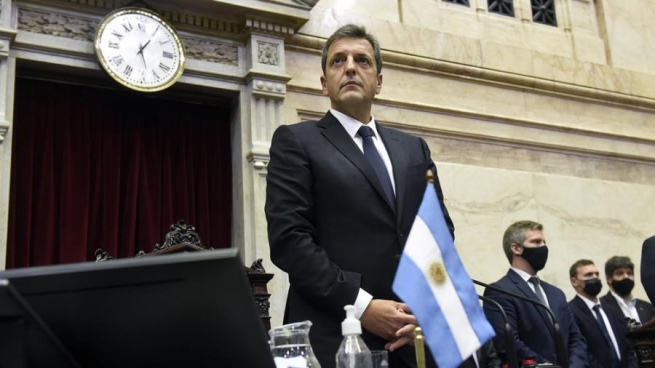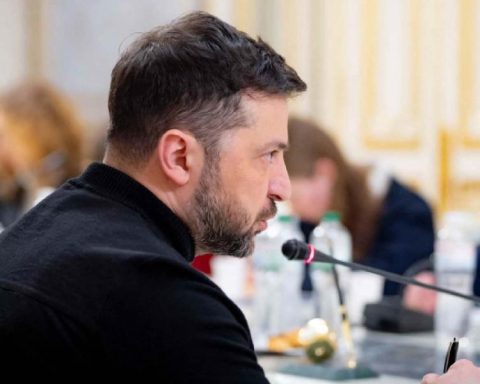The Government and the ruling party are determined to carry out a reform of the pension system that incorporates an additional 6% of contributions paid by employers. That extra contribution, according to the proposal advanced by the Government, should go to a common fund, in order to have a system that is effectively tripartite, contributory and supportive, which is basically what exists in the vast majority of countries with security systems. Social.
But there is a problem: although in the context of the social explosion the right was open to the possibility of including a percentage of solidarity, now it insists on demanding that that additional 6% also go to individual capitalization. This, despite the fact that the government discourse is clear that this extra contribution corresponds to the contribution of employers as a productive sector, in no case is it money that is extracted from the wages of workers.
The point is that, given this ‘contention’, there are already voices from the ruling party that do not take a dim view of disputing the 10% base that is currently quoted and asking each worker to decide if they want to remain in the AFP system or, if they do so wish, withdraw their accumulated funds and transfer that 10% to quote it in an alternative system that may be created by law. Why not? Why force people to contribute that 10% in a system whose legitimacy they do not share? In this way, if there is no openness to reason about a system that incorporates a pool of tools (including solidarity), why not allow Chileans who disagree with the AFPs to withdraw their funds and transfer them, for example, to a future cooperative, such as those operating in Australia? With this, ruling parliamentarians believe that an anomaly would also be corrected: that people are forced to save in a single system.
This is how the dialogue in Congress begins to get complicated, and this is due to the ideological dogmatism denounced by deputies such as Andrés Giordano, of the Libertarian Left movement, who is in favor of reaching an agreement with the opposition to carry out the project promoted by the minister Treasury, Mario Marcel. A project that, although it does not share 100%, at least it considers that it is a step towards the creation of a slightly more reasonable and “less aberrant” pension system. If there is no opening or possibility of reaching an agreement in Parliament –the correlation of forces requires the support of part of the opposition–, then the fair thing would be to controvert and dispute that 10% base. Said in good Chilean: that each one decides whether to continue contributing to an AFP or not.
Will the right want to be confronted with its own discourse, the one that exalts the freedom to choose? It is the question that is being asked in the sectors of the left. “When the Right of Rejection or the AFPs themselves campaign for ‘freedom of choice’, they lie. The AFPs are interested in continuing to manage the workers’ funds because they generate unforeseen profits in any other area. The right is interested in defending the business community, which obtains capital at the price of an egg from our pension savings, ”says the parliamentarian, who has built his political career as a union leader. He was, in fact, the first person to build a Starbucks union around the world.
“If it is about freedom, ask any of them if they are willing to give the freedom to go to another alternative system without individual capitalization, or to choose if the 10% can be managed under another logic. That’s as far as the speech goes,” adds Giordano.
Congressman Diego Ibáñez believes that, as things stand, it is fair to talk about that 10%. “This debate is going to take place in Congress once the reform is introduced,” declares the deputy from the Frente Amplio Social Convergence. “Regarding that 10%, I suggest looking at what is done in countries with schemes with public sense,” he adds. He knows that the right has locked itself up in individual capitalization again, thinking that the principle of “solidarity” has already materialized through the Universal Guaranteed Pension (PGU). However, this pillar continues to be, to put it in some way, “modest” and insufficient, because “we all know that, although President Boric wants to raise that PGU to 250 thousand pesos, it is still well below the line of the poverty, so we will necessarily have to complement it with other contributions and that means incorporating more solidarity into what we currently have”.
the freedom to choose
“I care that the cat catches mice,” says the president of the Senate Labor and Social Welfare Committee, Luciano Cruz-Coke (Evópoli). “The government has the ball here, the opposition does not. Until now we know only generalities regarding that additional 6%, and we understand that it would remain as it is. But, in short, the minister up to here reports by drop”, he adds.
Cruz-Coke reacts with bewilderment at the possibility of intervening on the 10% base. To a certain extent, and supported by the polls that indicate that an overwhelming majority wants to maintain ownership of their funds, the opposition is certain that this 10% is out of the question, especially when the project designed by Minister Marcel respects the destination that currently has said 10%. And since no one could touch that floor that the AFPs manage today, any mention of an alternative destination sounds like sacrilege. The problem is that from the ruling party they speak precisely of that: of the freedom to choose. For the rest, no one would question the ownership of the funds, but each contributor is allowed to take their money to the system that best suits them.
The senator from Evópoli says that he has no problem with introducing innovations, “as long as it is open to the greatest possible competition so that it is a socially legitimate system,” he adds. However, in some sectors of the ruling party they believe that the right would only be open, at most, to the creation of a state AFP, which is not satisfactory, since it does not change the logic of individual capitalization that so violently affects a good part of that left.
Why not let everyone decide what to do with that 10%? If two million people decide to withdraw their money from the AFPs and form a solidarity cooperative, why prevent it? The AFP industry asks that people choose the destination of that additional 6%, but from the left they begin to wonder why, in this case, not take the freedom to choose to the last consequences and decide what is done with the 16 % complete. “Well… to the extent that they are actors that can give guarantees to the population, an insurer perhaps, and that they will be able to assume when the contributors retire and that they offer a certain guarantee that those funds will be available…” add. However, he believes that there are favorable winds for individual capitalization, since, thanks to pandemic withdrawals, “a certain awareness was opened that this money existed, that it rents and that the State ensures progress with the PGU.”
“It is very easy to play for slogans”, maintains the senator from Evópoli, who declares himself aware of the complexity of the challenge. “There is no silver bullet in this. No one can say that everything will be distributed or that everything will be capitalized. I would get out of that binary logic”, he adds, although he does not mention a specific proposal that, as an alternative to that of Minister Marcel, combines different sources of financing. “Creative formulas must be found, perhaps allowing withdrawals for certain purposes, such as catastrophic illnesses, or for mortgage loans, or for loans at reasonable rates against future contributions,” he finally comments.
But deputy Andrés Giordano notes that Senator Cruz-Coke illustrates well the position of his sector, one that never ceases to surprise him, since in that world there is much talk of incorporating some solidarity but, when it comes to definitions , show their absolute rejection of any idea that effectively incorporates it into the listing scheme. Also, Giordano sees how from the opposition there is talk of promoting a reform, but all the ideas (few in number, he clarifies) point to maintaining what exists. That it is proposed that people can withdraw pension savings to face a catastrophic illness, means – in his opinion – that the right has not learned anything in terms of social rights.
To make matters worse, he warns that the opposition’s public discourse continues to be anchored to ideas that go beyond the concept of social security. “It is important to understand that property and heritability are notions that the right and business have created to defend profit, but that they are not part of the debate in any other pension system in the world, because they are ideas that are totally incompatible with the right to social security and to have a decent and sufficient pension”, he points out. In the long run, the former union leader believes, the important thing is to inherit a social security system, not a few pesos that may be meager or outright non-existent.
“We are going to hold the debate along these lines, proposing, for example, that the business contribution – which has been zero for more than 40 years – rise to 8%, and that of workers lower it to 8%. I hope that those who believe that old age is a business take off their masks. On our side, it is about having the best possible pension system and that retirement once and for all is a reason for jubilation”, he points out.
The deputy Diego Ibáñez reflects on what he has seen from the opposition in this debate: a closure against any change, even before a proposal as “reasonable” and “moderate” as the one prepared by Minister Marcel. It is even worse to see it contradicting its fundamental ideological principles, which speaks not of a defense of a system or way of life, but of a defense of corporate interests. “Until now I don’t see the right defending the concept of individual freedom,” adds the parliamentarian, in terms of preventing even people from deciding what to do with that contribution that necessarily goes to the AFPs.
Ibáñez believes that the right has already forgotten the social outbreak. “On the right there is a misrepresentation about this and about the concept of social security, about sufficiency and universality, something very different from what one sees on the right in France and Germany, for example, where they understand the value of solidarity”, emphasizes. “Entrusting all the collective contribution to what can be delivered through the PGU is fiscally irresponsible, because that means that it will be paid with general taxes that, we know, rest on VAT, and we know that VAT is regressive because it affects more people with lower incomes”, he concludes.


















